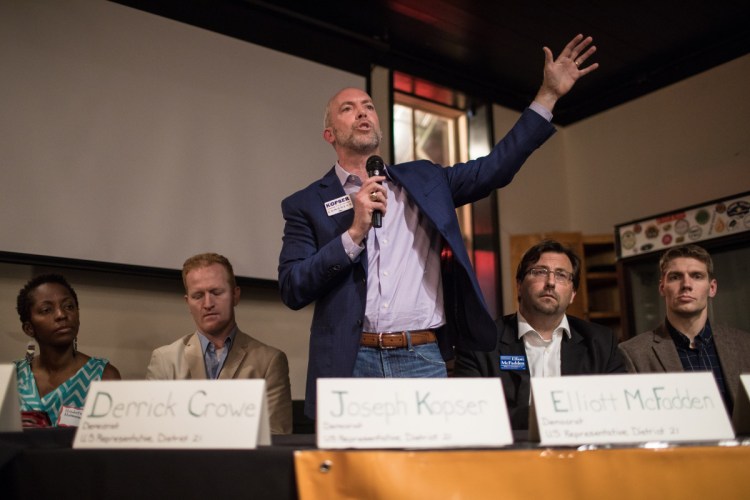AUSTIN, Texas — The candidate forum at Scholz Garten, a stone’s throw from the Texas State Capitol, was organized by 350.org, a liberal group focused on climate change. So there was little doubt what answer the moderator was seeking when he asked about support for “a complete nationwide fracking ban.”
Eight of the nine Democrats present, running for open seats in central Texas congressional districts 10, 17, 21, 25 and 35 , provided it: Of course, they support a full ban on fracking. The lone Republican said as much, too.
But not Joseph Kopser. “No, I am not,” he said to boos. “To call for a ban on fracking is just to invite coal back.”
An aerospace engineer trained at the U.S. Military Academy, Kopser vows on his website not to pander to any special interest but to base his public positions on two things: constituent “input and verified scientific data.” Part of a nationwide wave of scientifically trained people running for office at every level of government this year, Kopser said he was motivated to run because he sees science being devalued in society – particularly by the Trump administration.
“I absolutely feel that science is under attack,” Kopser said. “It’s the opposite of when John F. Kennedy said he wanted to get us to the moon in less than 10 years. The way Trump is going, in 10 years he’ll have us back in caves.”
The rising activism among scientists is a turnaround for a group that has traditionally seen politics as “grimy and grubby,” said Terry Madonna, a professor of public affairs at Franklin & Marshall College in Lancaster, Pennsylvania. Many of these candidates have been recruited by 314 Action, a political action committee founded in 2016 to support policymakers who have scientific or technical backgrounds.
Named for the first three digits of pi, 314 Action describes itself as the vanguard of “the pro-science resistance.” The group’s founder, Shaughnessy Naughton, said 7,000 people have responded to the group’s call to run for office. The group has also assembled a network of about 400,000 donors eager to support candidates who back science-based policies.
While a few scientist-candidates are running as independents, most are Democrats making their first foray into party politics. (More than 80 percent of scientists in a 2014 Pew survey identified as Democrats or Democrat-leaning.) 314 Action is working with 30 congressional candidates across the country and expects to formally endorse about half that number. They include stem-cell researcher Hans Keirstead, who is running to challenge Rep. Dana Rohrabacher, R-Calif.; Mai Khanh Tran, a pediatrician who came to the United States as a child refugee from Vietnam; and Chrissy Houlahan, a Stanford University-trained engineer who is running in suburban Philadelphia.
314 Action has not endorsed any GOP candidates. When asked whether her organization would consider backing a Republican who supported evidence-based policy, Naughton joked, “Bring me the unicorn.”
In fact, a few exist: Samuel Temple, a statistician for AT&T, is running in the crowded Republican primary for the same open seat as Kopser. Temple earned a master’s degree in statistics, is the author of several peer-reviewed papers on anxiety disorders and showed up at Scholz’s for the 350.org forum in Austin, where he identified himself as the “last moderate Republican.”
Given the opportunity, “you will find plenty of doctors and scientists who will vote Republican,” Temple said.
Texas’ 21st District seat is filled by House Science Committee Chairman Lamar Smith, R, who is retiring after three decades in Washington.
As he drove between events in San Antonio and Austin one day last month, Kopser said Smith has been “losing touch with science and facts.” For example, Kopser said, Smith has railed against a ” climate-change religion ” and issued subpoenas for researchers’ emails and data.
Kopser, who describes the dangers of climate change as a “threat multiplier” on his site, advocates for additional government support for clean energy.
Scientists are scarce in Congress. Only one member has a doctoral degree in science – Rep. Bill Foster, D-Ill., a former high-energy physicist at Fermilab. Rep. Jerry McNerney, D-Calif., worked as an engineer and has a PhD in mathematics. A few others have undergraduate science degrees, including Rep. Louise Slaughter, D-N.Y., who studied microbiology. Fourteen members of Congress are physicians, 12 of whom are Republicans. By contrast, there are seven radio talk-show hosts and 200-plus lawyers.
Send questions/comments to the editors.



Success. Please wait for the page to reload. If the page does not reload within 5 seconds, please refresh the page.
Enter your email and password to access comments.
Hi, to comment on stories you must . This profile is in addition to your subscription and website login.
Already have a commenting profile? .
Invalid username/password.
Please check your email to confirm and complete your registration.
Only subscribers are eligible to post comments. Please subscribe or login first for digital access. Here’s why.
Use the form below to reset your password. When you've submitted your account email, we will send an email with a reset code.